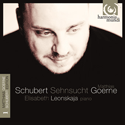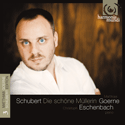17 Jun 2009
Die schöne Müllerin at Wigmore Hall
Matthias Goerne and Christoph Eschenbach unite in a Schöne Müllerin of searing intensity.

Matthias Goerne and Christoph Eschenbach unite in a Schöne Müllerin of searing intensity.
I first reviewed Goerne’s interpretation of Die schöne Müllerin in 2000, a revelatory experience in that his was the first version of this work which seemed to belong more to the world of Winterreise than to the gemütlichkeit with which Schubert’s first Müller song cycle is generally associated. In conversation a couple of years later on, he gave his view of the work — “All this naïveté — the boy walking through the trees… finding love and all that, is not what the work is about; it is much, much more involved with what might be called ‘Sturm und Drang’” — and he regarded the songs after ‘Pause’ as ‘a descending spiral for which the only culmination is death by suicide.’ Judging by this evening’s performance, he has now decided that the descent begins much earlier than that.
Goerne has at times appeared to shop around for his accompanists, seemingly in a quest to find the one who most nearly comes close to his own unique concept of Lieder. Previously it was Eric Schneider who filled that role, but in Christoph Eschenbach he seems to have found the ‘Seelenfreund’ whose playing is, if anything, even more rapt, mesmerizingly slow and intense than his singing. If ever a singer and pianist were as one in their freedom from the constriction of the bar lines, then these two are.
This is the ultimate serious This is the ultimate serious Schöne Müllerin, barely leavened with a touch of lightness — all the humour is sardonic, all the beauty deceptive, all the tempi so slow as to seem at times in danger of standing still. Of course I loved every phrase, but I can quite see that for many, this is not “their” Schöne Müllerin — for that, you need to go to Quasthoff or just about any other Lieder singer around today. barely leavened with a touch of lightness — all the humour is sardonic, all the beauty deceptive, all the tempi so slow as to seem at times in danger of standing still. Of course I loved every phrase, but I can quite see that for many, this is not “their” Schöne Müllerin — for that, you need to go to Quasthoff or just about any other Lieder singer around today.
‘Das Wandern’ is not a jolly romp but prefigures what is to come — within the subtle variations of “vom Wasser” and “Wandern” we are made aware that this is not a frolicsome lad but one whose ultimate fate is to be in thrall to an illusion — the spirit of that other deceptive piece of “rural idyll” Tennyson’s ‘May Queen’ seems to hover over us throughout — “They say he’s dying all for love, but that can never be: / They say his heart is breaking, mother — what is that to me?” Goerne seems to have decided that the crucial turning point in the cycle comes much earlier than generally supposed — here, with the line “Ist das denn meine Strasse?” sung in tones of suppressed fear and anguish, we are virtually in suicide land with the second song.
The wonderful ‘Danksagung an den Bach’ is so often sung as pretty ditty, but here we had frank, straightforward questions about the speaker’s future, culminating in superficial yet ultimately doomed exuberance. I have never heard ‘Der Neugierige’ performed with such intensity — singer and pianist united as if in prayer, the little questioning phrases after “ob mich mein Herz belog” played almost in a reverie, “die ganze Welt mir ein” taken so slowly that it became a kind of litany. I need hardly add that the earth stood still as far as most of the audience were concerned, but I can quite see how some might find it a little, shall we say, over-wrought?
‘Eifersucht und Stolz’ like most of the more vigorous songs was taken at a cracking pace, the diction at “da steckt kein sittsam Kind den Kopf zum Fenster ‘naus” remarkably crisp despite the speed, and this was followed by a ‘Die liebe farbe’ only just short of psychotic — the amount of sheer hatred packed into the seemingly innocent line “mein Schatz hat’s Grün so gern” had to be heard to be believed.
The bleakness never really lets up, ‘Trockne Blumen’ touching new depths of the most profound sadness, no triumph at “der Mai ist kommen” instead only the sense that the coming of May is cruel in the same way as Eliot’s April is, because it brings the Spring and hope so welcome to all but the poet. The final “lullaby” was again taken at a “slow and stopping pace” and some of the words were a little mangled in the process — indeed, scrupulous though his concern for the language is, Goerne does have a tendency, alarming to those of nervous disposition, to be somewhat free with what goes where in a song. One could put this down to his fervent intensity getting the better of him, since it cannot surely be lack of familiarity with the text.
Goerne says that “People always think of Winterreise as being dark, gloomy, but the man does not die at the end, he goes on, unlike the youth” (in Die schöne Müllerin). Indeed, and the wanderer’s “Nun weiter denn, nur weiter” of the later work seems positively rosy-cheeked cheeriness compared to this miller lad’s desire to weep the green grass “ganz totenbleich.” One anticipates Wednesday’s Winterreise and Saturday’s Schwanengesang with eagerness tempered with apprehension — this first installment of Goerne and Eschenbach’s interpretation of these works (recorded on Harmonia Mundi, and soon to be followed by further discs) promises evenings of an intensity as troubling as it is breathtaking.
Melanie Eskenazi
 |
 |
 |
| Sehnsucht | An mein Herz | Die schöne Müllerin |